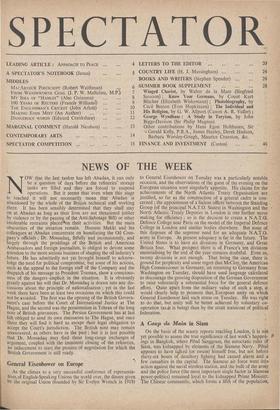NEWS OF THE WEEK
NOW that the last tanker has left Abadan, it can only be a question of days before the refineries' storage tanks are filled and they are forced to suspend operations. But it seems that even when this stage is reached it will not necessarily mean that Abadan is abandoned by the whole of the British technical staff working there. It has been sensibly determined that they shall stay on at Abadan as long as their lives are not threatened (either by violence or by the passing of the Anti-Sabotage Bill) or other intolerable restraints placed on their activities. But the main obscurities of the situation remain. Hussein Makki and his colleagues at Abadan concentrate on humiliating the Oil Com- pany's officials ; Dr. Mossadaq, fitfully and inconsistently, and largely through the proddings of the British and American Ambassadors and foreign journalists, is obliged to devote some attention to the more serious business of shaping the oil industry's future. He has admittedly not yet brought himself to acknow- ledge the need for political compromise, but some of his actions, such as the appeal to the foreign staff of the Company and the despatch of his message to President Truman, show a conscious- ness of the dangers -implicit in the situation. It is obviously greatly against his will that Dr. Mossadaq is drawn into any dis- cussions about the principle of nationalisation ; yet in the last week there have been at least two occasions On which this could not be avoided. The first was the opening of the British Govern- ment's case before the Court of International Justice at The Hague, and the second was the presentation in Tehran of the long note of British grievances. The Persian Government has at last felt obliged to send its own emissaries to The Hague, and once there they will find it hard to escape their legal obligation to accept the Court's jurisdiction. The British note may remain unanswered, as others have in the past ; but it is just possible that Dr. Mossadaq may find these long-range exchanges of argument, coupled with the imminent closing of the refineries, an inducement to start the process of negotiation for which the British Government is still ready.






















































 Previous page
Previous page